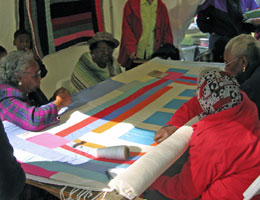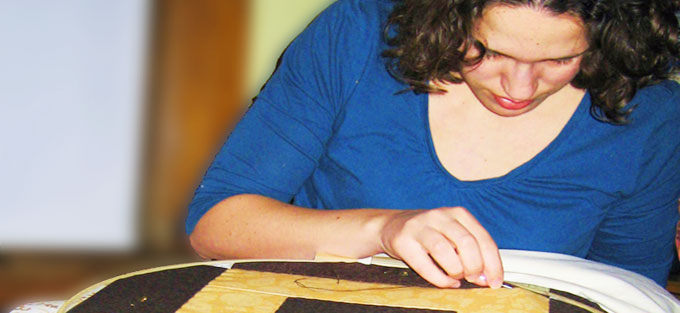by Sara Olson-Smith
I made my first quilt when I was in college. I learned about quilting mostly from books and the Internet. When I got stuck I would turn on my computer to try to figure it out. For generations, women would have watched and learned from their aunts or grandmothers when they had these sorts of questions. But when I started quilting I turned instead to YouTube to solve my quilting dilemmas.
This worked until I tried to make mitered corners, those beautiful crisp 90 degree edges on the binding of a quilt, with little matching triangles of folded fabric. I could never figure it out. I watched countless videos. I followed step by step tutorials. But my own edges were never pretty. After too many ugly corners, I gathered up my pride and my unfinished quilt and went to a gathering of quilters at church.
They couldn’t have been happier to help me out. Jean pulled up her metal folding chair next to mine, and with wrinkled, bent fingers picked up some pins and showed me just how to make a mitered corner work. And seeing it, in real life, with the help of a woman who had been doing it for decades, made those complicated corners seem so very easy.
Generational groupings
 We live in a time when we are divided into distinct generational groups. Older people spend time with older people. Empty-nesters get together with empty-nesters. New moms gather with new moms. Young adults make their ways to one another. Often the only time we are with people of other generations is when we are with our own families, or with our co-workers, or, perhaps, sitting on metal folding chairs at church.
We live in a time when we are divided into distinct generational groups. Older people spend time with older people. Empty-nesters get together with empty-nesters. New moms gather with new moms. Young adults make their ways to one another. Often the only time we are with people of other generations is when we are with our own families, or with our co-workers, or, perhaps, sitting on metal folding chairs at church.
This generational clumping is a loss, because we need each other. We need friendships with women from other generations for so much more than just quilting advice. As young women particularly, friendships with older women offer us new ways of seeing ourselves and our world. These friendships provide a sort of solid ground as we make our way through the sometimes shaky path of trying to figure out ourselves and our place in the world.
The thing is, so often we make our way through the questions in life like I did with those mitered corners. We turn to a screen to sort out a worry we have. We even turn to non-human sources to figure it out the bigger questions of faith and identity.
Our people resources
And yet a person, another woman, is often just what we need. Books and websites and online quizzes can only take us so far. What we usually need is the presence of someone who can listen with knowledge of one who has been there. We need the stories from people who have walked before us on the journey of being a woman.
When we sit with women who have blazed trails into roles we now take for granted, or who have navigated much deeper waters of sexism, or who have survived great struggle we can take our own steps with new kinds of courage. We can trust our own strength seeing the strength of another. We find ourselves and our perspectives changed.
My friend Ev
At the first church I served, I led a Bible study every week with a handful of older women. They ranged in age from 50-something to 80-something. And there was me, in my 20s. Supposedly, I was the one with the knowledge, but I learned so much from those women and from their questions, insights and stories.
One of those women died last year. Despite being a Yankees fan (I’m a Minnesota Twins fan), Ev was an amazing woman. She had a deep faith that on the surface seemed almost child-like because she simply trusted God. She would actually radiate when she sang. She would tell stories of waiting for her beloved to come home from war, about raising a family, about her generosity to the church, the ways she forgave people who’d hurt her, about surviving cancer, about how she wasn’t afraid to die, about the goodness of God.
It wasn’t just our favorite baseball teams that were different; Ev was at least 50 years older than I was. And yet our friendship was one that helped me gain perspective and offered me insight into the ways I wanted to live in the world. She gave me courage to just trust God, to love deeply, to sing with abandon, and to not be afraid of death. I could never have learned that from a blog post, or a really good book, or even from my very best college girlfriend.
My similarly aged friends often struggle with the same sorts of questions I struggle with. And we make our way through those questions with the same maps. But my older friends have a view from much further along the road. Their resilience and strength, and even their limits and prejudices and fears, can teach me about my own.
I had pie awhile ago with some younger women. (I’m getting older now too, I guess.) They’re in their last year of college and full of passion about gender equality and social justice and changing the world. I listened and realized that as I’ve gotten older, I’ve gotten too comfortable and maybe a bit apathetic. I’m grateful for those friendships with younger women, too. I need to have my own fire re-kindled.
We need each other.
Discussion questions:
1. Why do you think we so often stick with people of our own generations? What are the limitations of this?
2. Who is someone from a different generation whose friendship has been a gift to you? What have they taught you?
3. How might you befriend someone of another generation?
Closing prayer:
God of the ages, we thank you for generations of women who have trusted you and followed your son, Jesus. Guide us into friendships through which we can come to know one another, ourselves, and you more deeply. Give us courage to risk being changed by both our similarities and our differences. Amen.
The Rev. Sara Olson-Smith is an associate pastor at St. Paul Lutheran Church, in Davenport, Iowa. She lives in Davenport with her spouse, Clark and daughter, Susannah.
Would you like to take this article with you when you gather with other women? Check out Cafe Groups. Each month you can download a PDF of both articles.


Thank you for putting this into beautiful words, Sara. One of my dearest friends is 30 years older than me and another is 25 years younger. You are right: those friendships across generations are rich with blessing.
Your words are so true, I became a part of a bible study and joined a WELCA circle a couple of years ago. Then a group of us started making quilts for LWR and it has been such a joy. All ages of women together working, laughing and sharing our lives. It was the best move I ever made. I am 57 and wish I would have done it sooner but maybe I appreciate it more being older. I was always striking out on my own, resisting being part of a group. Now I wouldn’t have it any other way, the generations have so much to teach each other.
I couldn’t agree more. I am the current chair of the W ELCA planning committee. We keep reaching out to the younger women in an effort to have them come to our gatherings but it doesn’t happen. Having been a military spouse for many years, I needed my women’s group (Protestant Women of the Chapel) and my church family to fill the holes left in my life living so far from family. So I jumped into W ELCA when I joined the local Lutheran Church where we retired. I love the women in our group. I still live far from my mom and most of them are my mom’s age. But I have young children cuz God had a unique timing for children to arrive in my life.
I am not giving up and I am so very grateful for the many choices there are for women to connect through W ELCA. I promote them all hoping that someone in my congregation is benifiting from them. Thanks for all the National office does!
I’ve been blessed with many friends over my lifetime. Many were 20 years younger or older. We all seemed to get along. To see the perspective of someone else of another generation, to learn and teach. I’m in my 50’s, and some of my friends today are the parents of high school classmates/friends.
I am concerned of the future of our Welca group.In a church with the history of 5 active Circles we are now down to 2,1evening and 1 in the afternoon(average age of 70+)I am 83 and not able to be very active.I liked the example of the young pastor asking for help from the church quilting group!